English Words in Action, Group C
(a variety of English words which have developed through history and are currently used in our modern age)
Simply click on this banner (or the following link) and you will be on your way to stimulate your brain for greater word comprehension with quizzes based on some of the words in this unit.
2. A confusing or difficult problem: Trying to decide between chocolate cake or chocolate ice cream is a conundrum for Jeremy.
3. A riddle, especially one with an answer in the form of a pun or a play on words: The challenge of the contest was to think of a conundrum for which a pun was the correct answer.
4. Etymology: believed to have first appeared in 1596, an Oxford University slang term for "pedant"; also "whim", etc.; later in 1790, "a riddle, a puzzle"; also spelled quonundrum; the kind of unmanageable pseudo-Latin words which were once considered the ultimate of humor among the educated in classical languages.
Most linguistic and dictionary sources say the word is "of unknown origin" or "of uncertain origin"; however, it is often used in modern writing and spoken by speakers on the radio, TV, etc.
2. Etymology: "come to blows with", from Old French couper, earlier colper, "to hit, to punch", from colp, "a blow".
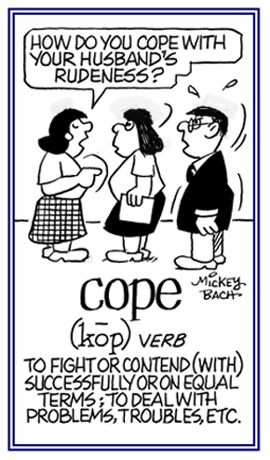
Go to this Word A Day Revisited Index
so you can see more of Mickey Bach's cartoons.
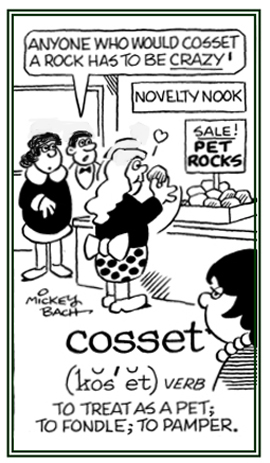
Go to this Word A Day Revisited Index
so you can see more of Mickey Bach's cartoons.
Mark's coterie included several well-known writers who have had several books published.
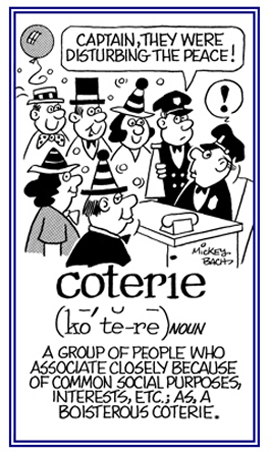
Go to this Word A Day Revisited Index
so you can see more of Mickey Bach's cartoons.
2 Relating to behavior that is presented in an obedient and an excessive or servile way: The waiter at the restaurant served Janet and James their meal in a courtly manner.
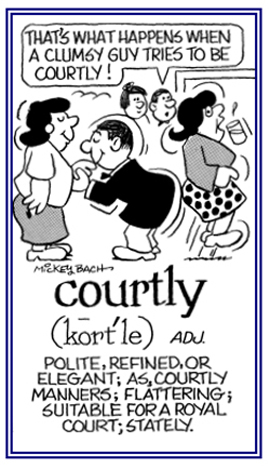
Go to this Word A Day Revisited Index
so you can see more of Mickey Bach's cartoons.
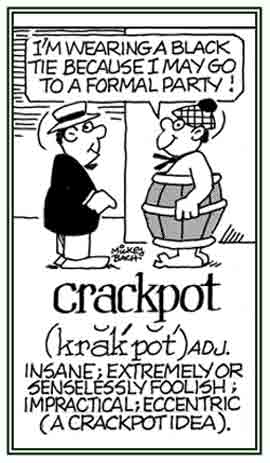
Go to this Word A Day Revisited Index
so you can see more of Mickey Bach's cartoons.
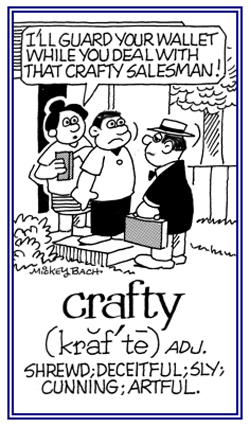
Go to this Word A Day Revisited Index
so you can see more of Mickey Bach's cartoons.
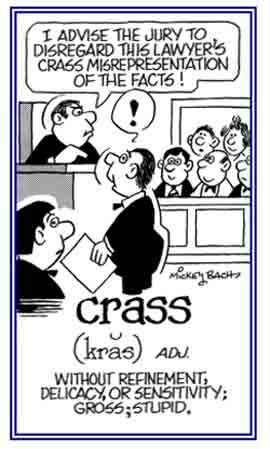
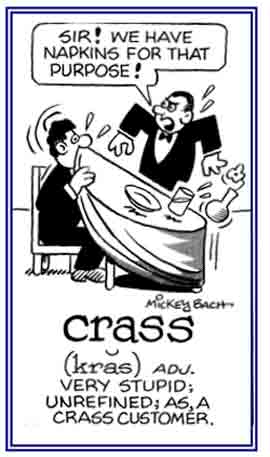
Go to this Word A Day Revisited Index
so you can see more of Mickey Bach's cartoons.
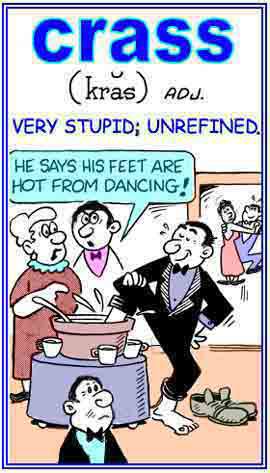
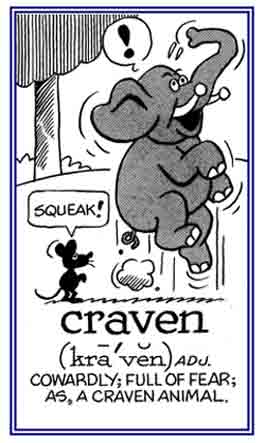
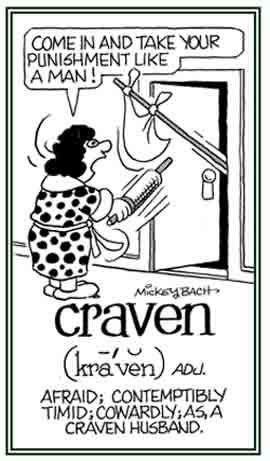
Go to this Word A Day Revisited Index
so you can see more of Mickey Bach's cartoons.
2. Primarily British, a hospital for orphaned infants; a foundling hospital: Merna's aunt worked as a housekeeper at the famous crèche for orphaned children after the war.
3. Chiefly British, a day care center; a place where young children are cared for during the day while their parents are working: Katherine learned many delightful songs and games when she attended the local crèche.
4. In biology, a group of young birds, animals, etc. that stay together for protection; especially, among birds, a gathering of the young of several families, tended by one or more adults; such as, ducks, geese, etc.: The fox crèche which included about six fox babies was watched over by the vixen or mother fox.
5. Etymology: from French for "crib", a day nursery provided by the state, a local government, or by private institutions which enables mothers to work while their babies are cared for by others.
A crèche, or communal nursery
Even the crèche, which is the social core of every pride of lions, is shaped by violence. This was verified after scrutinizing groups of nursing mothers for countless hours.
A lactating female nursed another's young rarely, usually after an unrelated cub sneaked onto her nipple. An alert lioness reserved her milk for her own offspring.
In contrast to the widespread belief that crèches were maternal "day-care centers", it was observed that nursing mothers stick together primarily for defense.
During takeovers by outside males, solitary females lost litter after litter, while cooperating lionesses stood a better chance of protecting their cubs and fending off males, each of which can outweigh a female by as much as fifty percent.
2. To make a sudden movement from fear of being hit or hurt: Sharon's dog cringed from the noise of the fireworks celebrating the new year.
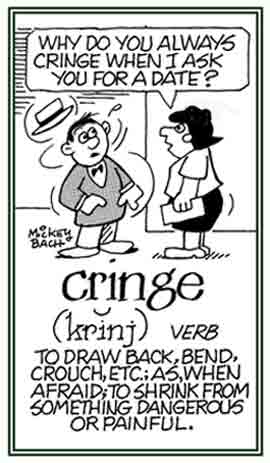
Go to this Word A Day Revisited Index
so you can see more of Mickey Bach's cartoons.
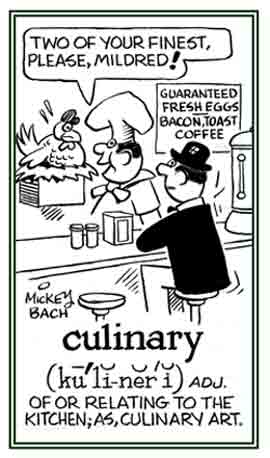
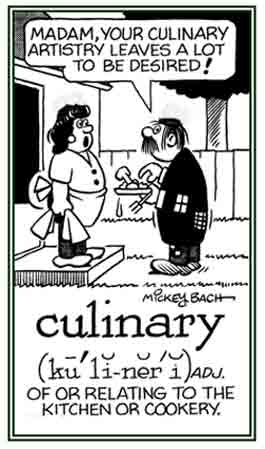
Go to this Word A Day Revisited Index
so you can see more of Mickey Bach's cartoons.
2. Etymology: from Latin colligere, "to gather together, to collect"; originally, "to choose, to select".
The giant fireworks display culminated the Fourth of July festivities.
2. To come to completion; to end: After years of being separated, the reunion of the brothers and sisters culminated in tearful embraces and kisses.3. In astronomy, to reach the highest point above an observer's horizon referring to the stars and other celestial bodies: The midsummer moon culminated in the sky just after midnight.
4. To bring to the point of greatest intensity or to completion: The ceremony culminated after two weeks of preparation.
5. Concluding, resulting, terminating: Their disagreement culminated in a fight.
6. Etymology: "to reach the highest point, to peak, to climax"; borrowed from Late Latin culminatus, culminare, "to crown"; from Latin culmen, culminis, "top".
Gerald's achievements as an astrologist stand as a culmination of several years of development.
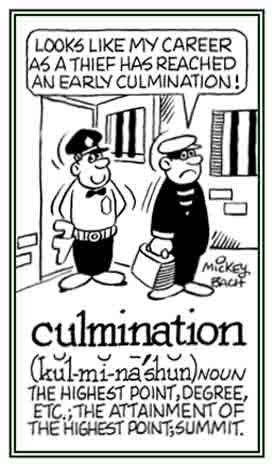
Go to this Word A Day Revisited Index
so you can see more of Mickey Bach's cartoons.
Links to all of the groups of English words in action, Groups A to Z.
You may see the bibliographic list of sources of information for these words in action.


